I’ve always been of the strong opinion that (a) people should talk about programming, not coding, and (b) people learn best on a kind of need to know basis.
Read MoreQuestion mark - Terry Freedman
Question mark - Terry Freedman
I’ve always been of the strong opinion that (a) people should talk about programming, not coding, and (b) people learn best on a kind of need to know basis.
Read MoreJust because everyone says something is good, doesn't mean it is.
Is 'making' really an effective -- or cost-effective -- way of learning programming?
Read MoreQuestion mark - Terry Freedman
I’ve always been of the strong opinion that (a) people should talk about programming, not coding, and (b) people learn best on a kind of need to know basis.
Read MoreIs being digitally literate synonymous with being able to code?
Read MoreThe next edition of this esteemed newsletter has a cornucopia of links that will be of interest to teachers of computing and media literacy especially, and very little commentary! Read on to find out more.
Read MoreThis book aims to teach you how to think like a coder, rather then merely learning how to code. How far does it succeed?
Read MoreIs 'making' really an effective -- or cost-effective -- way of learning programming? Guest contributor Derek Blunt has his doubts.
Read MoreShakespeare is alive and well!
"I wonder if it's possible to write a poem about coding", I thought to myself. Well, it is, and here it is. First Chaucer, then Shakespeare, and now me. No doubt schoolchildren of the future will be studying this for their Eng Lit exams, but in the meantime you can read it here first! Enjoy.
Read MoreShould you start with the raw components when teaching coding, or get the kids problem-solving immediately? This article argues in favour of the latter.
Read MoreNews, reviews, two competitions, free resources, interesting reading, a new Computing scheme of work, and women in computing -- just some of the stuff featured in the new issue of Digital Education. Subscribe for free!
Read More"As soon as I found out about how to write code, I was hooked. I realised that this was what I should have been doing all along." Anna Shipman, who works for the Government Digital Service, talks about her love of coding.
Read More The Hour of Code allows anyone to try out coding for the first time by teaching the basics of computer programming in just sixty minutes.
The Hour of Code allows anyone to try out coding for the first time by teaching the basics of computer programming in just sixty minutes.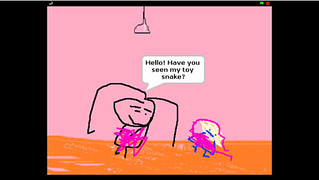 If you’re concerned that young children won’t be able to grasp computing concepts, or are worried about how you’re going to teach it, have a look around the Literacy from Scratch website.
If you’re concerned that young children won’t be able to grasp computing concepts, or are worried about how you’re going to teach it, have a look around the Literacy from Scratch website.
Managed – and, I think, written by – Lawrence Williams, the website contains examples of pupils’ work in Scratch, cross-curricular ideas and examples, and notes on pedagogy.
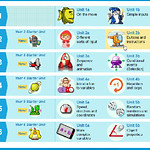 This application is designed to teach Computing at Key Stages 1 and 2 (a more sophisticated version for older pupils is being worked on).
This application is designed to teach Computing at Key Stages 1 and 2 (a more sophisticated version for older pupils is being worked on).
What struck me immediately on using it is the amount of guidance available, both in verbal form and videos. There is quite a large range of modules to choose from, including “Starter” ones which take you through the basics and, where appropriate, recapitulate what has already been learnt.
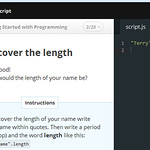 Code Academy is an online tutorial-based website for teaching yourself how to code. You can select which programming language you wish to learn, from the following list
Code Academy is an online tutorial-based website for teaching yourself how to code. You can select which programming language you wish to learn, from the following list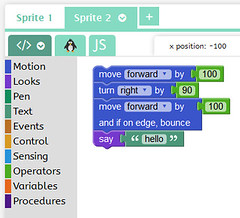 As usual, I gave this application a workout without seeking help from a manual or anything like that – which is just as well because there does not seem to be a comprehensive manual.
As usual, I gave this application a workout without seeking help from a manual or anything like that – which is just as well because there does not seem to be a comprehensive manual.
There are three applications in one: JIT5, LOGO and Visual. This is quite useful because if you are familiar with LOGO but not JavaScript, you can start pupils coding in an environment that is familiar to you. Also, if you teach very young children, JIT5 is highly visual and colourful.
An advantage of J2Code as a whole over 2Code is that it covers the age range from Key Stage 1 (5-6 year olds) to Key Stage 3 (13-14 year olds).
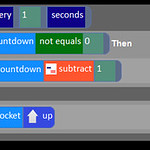 2Simple’s answer to the question “How can we teach coding to little ones?” is 2Code. The first thing that greets you when you go to the 2Code section of Purple Mash is the plethora of files to open.
2Simple’s answer to the question “How can we teach coding to little ones?” is 2Code. The first thing that greets you when you go to the 2Code section of Purple Mash is the plethora of files to open. I've been giving talks on preparing for the new Computing curriculum, and as well as waxing lyrical that also involves listening to others' concerns. It also means hearing about some innovative approaches that colleagues have adopted.
I've been giving talks on preparing for the new Computing curriculum, and as well as waxing lyrical that also involves listening to others' concerns. It also means hearing about some innovative approaches that colleagues have adopted.
At the same time, I have been conducting a survey of what people have been doing to prepare for the new curriculum. I'll be publishing the results in due course. In fact, some of the resources mentioned in the collection of coding resources in the early July 2014 edition of Digital Education came to my attention from that survey.
So, given that at the time of writing there's about 2 or 3 days to go till the end of term, what can you realistically do at this stage to prepare for September?
(c) Terry Freedman All Rights Reserved